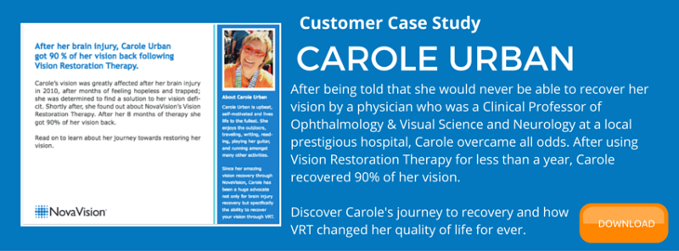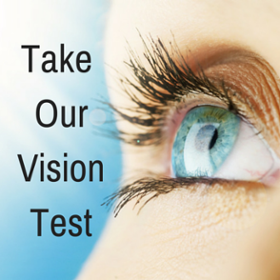 Various types of vision deficits can occur after a stroke or other brain injury, because of damage caused to specific regions of the visual cortex or its connecting neural network. Since our optic nerves traverse the length of our brain, it’s no surprise that there are so many ways stroke can affect the survivor’s eyesight. In addition to where the damage is done, the type of stroke altogether can determine on whether or not your vision may be impaired in the future. Strokes occur when the arteries that carry blood which contains oxygen to the brain become blocked or begin to bleed. Knowing more about strokes, specifically those that affect the posterior cerebral artery (or PCA) and how this directly relates to the patient’s vision can better prepare you to have a discussion about recovery with your doctor.
Various types of vision deficits can occur after a stroke or other brain injury, because of damage caused to specific regions of the visual cortex or its connecting neural network. Since our optic nerves traverse the length of our brain, it’s no surprise that there are so many ways stroke can affect the survivor’s eyesight. In addition to where the damage is done, the type of stroke altogether can determine on whether or not your vision may be impaired in the future. Strokes occur when the arteries that carry blood which contains oxygen to the brain become blocked or begin to bleed. Knowing more about strokes, specifically those that affect the posterior cerebral artery (or PCA) and how this directly relates to the patient’s vision can better prepare you to have a discussion about recovery with your doctor.

Image courtesy of http://www.slideshare.net/steveppowers/psych11-bloa-localisation-of-brain-function-exterior-structure
The primary visual cortex is responsible for the initial processing of visual information by the brain. The primary visual cortex receives information via a pathway of neurons that extends from a part of the brain knows as the thalamus, which transmits information directly from the optic nerve at the back of the eye.
What Makes a PCA Stroke Different?
Posterior cerebral artery strokes occur less often than strokes involving the anterior circulation. The posterior cerebral artery arises from the top of the basilar artery and feeds the medial occipital lobe and inferior and medial temporal lobes.

Images courtesy of https://patienteducation.osumc.edu/Documents/PCA-stroke.pdf
How Does This Relate to Vision Loss?
Vision is the primary function of the occipital lobe, so strokes affecting the posterior cerebral artery commonly cause visual deficits—specifically hemianopia. Although other types of stroke may also result in visual impairments, if the patient’s primary symptom is loss of vision they have likely suffered a PCA stroke.
Survivors who have suffered this type of stroke may report inability to see out of one eye. To confirm this is actually the issue, Doctors will typically have the subject cover each eye individually and assess the vision in each of the eye’s four quadrants. This is common practice because, although patients who have suffered a stroke on the right side of their brain may report poor vision in the left eye, they actually have a visual deficit affecting the left side of the visual field of both eyes.
The Occipital Lobe
In order to fully understand why a stroke in the Posterior Cerebral Artery so greatly affects your vision, you must also understand the importance and function of the occipital lobe. This part of the brain is our primary vision center, but each of the lobes receive visual information. According to Dr. Carl Garbus, an optometrist at the Neuro Vision Rehabilitation Institute in Santa Clarita, Calif., and president of the Neuro-Optometric Rehabilitation Association, or NORA “Almost every major area receives input from vision. That means that a stroke has potential to create some visual deficits, such as poor visual memory, decrease in balance, decreased depth perception and reading problems, to name a few.”
The occipital lobe in particular is critical for being able to correctly perceive what your eyes are seeing. This part of our brain has to operate quickly in order to process the rapid information that our eyes are sending. Similar to how the temporal lobe makes sense of auditory information, the occipital lobe makes sense of visual information so that we are able to understand it. If your occipital lobe becomes impaired, or injured it becomes extremely difficult to process visual signals.
We hope that the ability to have an educated and informed discussion with your Doctor has been the biggest takeaway from today’s blog. It’s important to know that both ophthalmologists and optometrists can diagnose vision problems, but vision rehabilitation is more likely to occur in an optometric practice. For more information about the types of therapies that are available for vision restoration and vision compensation, please feel free to contact us at any time.



